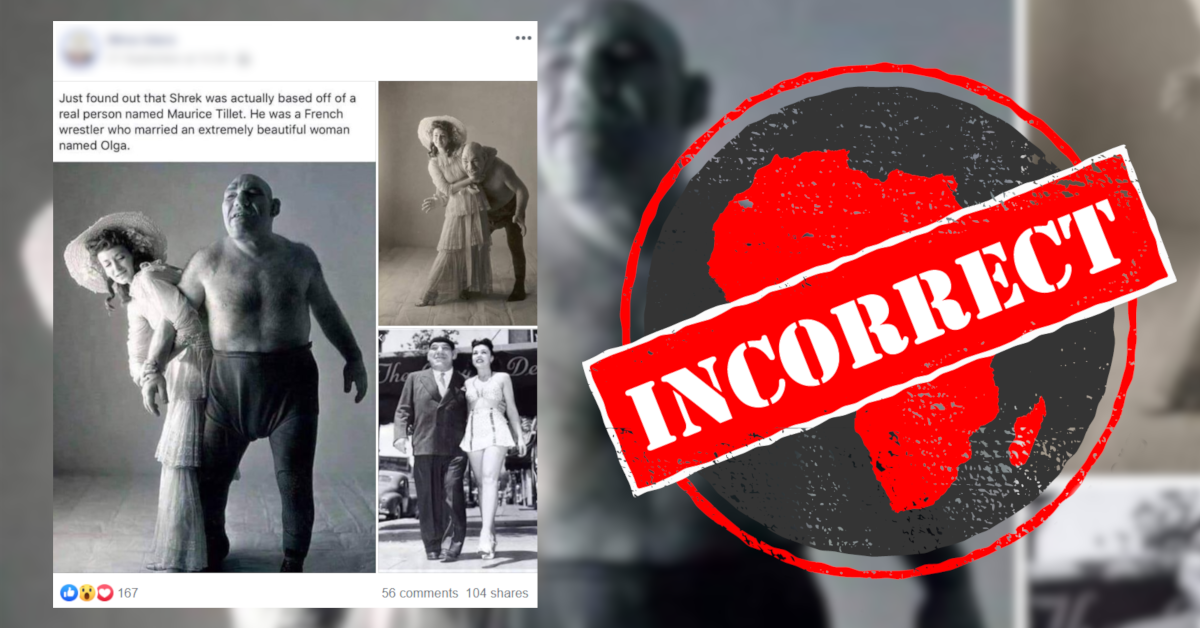Black and white photos shared on Facebook show a burly man who looks a little like the title character in the 2001 animated movie Shrek.
“Just found out that Shrek was actually based off of a real person named Maurice Tillet,” reads the caption of one. “He was a French wrestler who married an extremely beautiful woman named Olga.”
Who is the man in the photos? And was Shrek based on him?

A Google reverse image search of the first photo produces a large number of results. Most mention Maurice Tillet.
Born in Russia to French parents, Tillet was a world heavyweight wrestling champion in the 1930s and ‘40s. He later moved to the US. He was known by his professional wrestling name, the French Angel.
At 19 he was diagnosed with acromegaly, a hormonal disorder that causes the pituitary gland to produce too much growth hormone. This increased the growth of his bones, including in his hands, feet and face.
One fan has compiled an impressive amount of information on Tillet. From this and other sources, it seems the woman in two of the three photos was Dorian Leigh, a famous model of the era.
In 1945 the photographer Irving Penn took a series of photos of Tillet and Leigh.
The only “Olga” linked to Tillet is Olga Morasse. She was married to Lithuanian professional wrestler Karl Pojello. Tillet, Pojello and Morasse lived together in Chicago. The two men were close friends and are buried next to each other.
To some people, Tillet does look like Shrek.
But DreamWorks, the studio that produced the movie, has never officially addressed or confirmed the rumour that Tillet was the inspiration for the character.
The photos circulating on Facebook do show the wrestler Maurice Tillet. But there’s no evidence Shrek was based on him. The Huffington Post came to the same conclusion. – Eileen Jahn
“Just found out that Shrek was actually based off of a real person named Maurice Tillet,” reads the caption of one. “He was a French wrestler who married an extremely beautiful woman named Olga.”
Who is the man in the photos? And was Shrek based on him?

‘The French Angel’
A Google reverse image search of the first photo produces a large number of results. Most mention Maurice Tillet.
Born in Russia to French parents, Tillet was a world heavyweight wrestling champion in the 1930s and ‘40s. He later moved to the US. He was known by his professional wrestling name, the French Angel.
At 19 he was diagnosed with acromegaly, a hormonal disorder that causes the pituitary gland to produce too much growth hormone. This increased the growth of his bones, including in his hands, feet and face.
One woman in photos model Dorian Leigh
One fan has compiled an impressive amount of information on Tillet. From this and other sources, it seems the woman in two of the three photos was Dorian Leigh, a famous model of the era.
In 1945 the photographer Irving Penn took a series of photos of Tillet and Leigh.
The only “Olga” linked to Tillet is Olga Morasse. She was married to Lithuanian professional wrestler Karl Pojello. Tillet, Pojello and Morasse lived together in Chicago. The two men were close friends and are buried next to each other.
Inspiration for Shrek not confirmed
To some people, Tillet does look like Shrek.
But DreamWorks, the studio that produced the movie, has never officially addressed or confirmed the rumour that Tillet was the inspiration for the character.
The photos circulating on Facebook do show the wrestler Maurice Tillet. But there’s no evidence Shrek was based on him. The Huffington Post came to the same conclusion. – Eileen Jahn
Republish our content for free
For publishers: what to do if your post is rated false
A fact-checker has rated your Facebook or Instagram post as “false”, “altered”, “partly false” or “missing context”. This could have serious consequences. What do you do?
Click on our guide for the steps you should follow.
Publishers guideAfrica Check teams up with Facebook
Africa Check is a partner in Meta's third-party fact-checking programme to help stop the spread of false information on social media.
The content we rate as “false” will be downgraded on Facebook and Instagram. This means fewer people will see it.
You can also help identify false information on Facebook. This guide explains how.





Add new comment